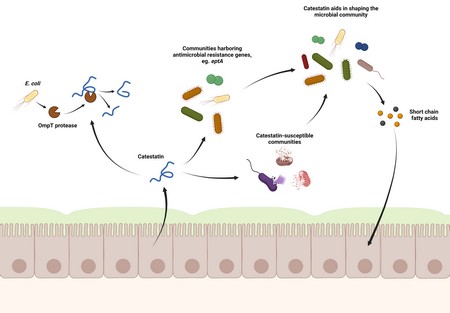New insights into how the gut regulates bacterial communities
The microbes in our gut have a big impact on our health. This microbial community is shaped by many factors, including diet and drug use. The lining of our intestines also produces molecules that can kill bacteria. Together with colleagues from the US, microbiologist Sahar El Aidy and her team at the University of Groningen investigated how one such molecule, catestatin, could affect the microbial composition in the gut. The results may have implications for the treatment of inflammatory bowel disease and were published in the ISME journal (online 19 April).

The microbes in our gut produce substances, such as short-chain fatty acids, that have a significant impact on our health. In turn, the body plays an active role in regulating the bacterial communities inside the gut, also called the gut microbiome. In the gut epithelium, the cell layer lining the inside of the intestines, are enteroendocrine cells that produce different hormone-like compounds. One of those is catestatin, the breakdown product of a longer prohormone called chromogranin A. ‘We know that catestatin has antimicrobial properties but this has only been tested in the lab and in vivo against pathogens,’ explains Sahar El Aidy, associate professor at the University of Groningen.
Homeostasis
It has been described that catestatin levels in the gut are altered in patients with Crohn’s disease and that it could have an effect on obesity and hypertension. ‘It appears to play an important role in maintaining homeostasis,’ says El Aidy. Therefore, she set out to investigate whether catestatin could affect the gut microbiome.
To this end, El Aidy and her team members Markus Schwalbe and Pamela González-Dávila used a mouse model that was developed by her collaborators from the University of California in San Diego. ‘This is a mouse strain that doesn’t produce catestatin; the gene was knocked out using genetic techniques.’ These knock-out mice were treated with catestatin for two weeks. Normal, catestatin-producing mice were given the same treatment. ‘We then looked for functional changes in the microbiome.’

Potential cures
The analysis showed an increase in the abundance of the gene for E. coli phosphoethanolamine transferase (eptA), which produces an enzyme that induces antimicrobial resistance. El Aidy: ‘Bacteria that are susceptible to catestatin disappear after treatment. Our experiments show that catestatin indeed affects the composition of the gut microbiome.’ The increase in resistance gene expression was found in both the knock-out mice and the normal mice but was more pronounced in the former. Additional experiments showed that E. coli bacteria also had a second resistance mechanism, a protein-cleaving enzyme called omptin.
‘These results help us to understand what shapes the bacterial community in the gut,’ says El Aidy. In several forms of inflammatory bowel disease, there is an abundance of E. coli bacteria and altered levels of catestatin. The resistant E. coli bacteria may start to dominate the microbiome. Their ability to bind to the intestinal epithelium could then play a role in the progression of the inflammation. Showing how catestatin shapes the microbiota in the gut is the first step in finding out more about the causes and potential cures for this disease.
Reference: Pamela González-Dávila*, Markus Schwalbe*, Arpit Danewalia, Boushra Dalile, Kristin Verbeke, Sushil K. Mahata and Sahar El Aidy: Catestatin selects for colonization of antimicrobial-resistant gut bacterial communities. ISME, first online 19 April 2022. *shared first author
More news
-
14 January 2026
What the smell of the sea does to the clouds above Antarctica
-
13 January 2026
New framework verifies AI-generated chatbot answers

